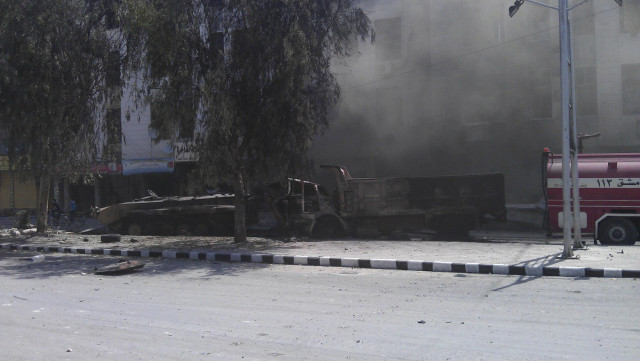Violence rages across Syria as UN mission clock ticks
At least 41 civilians were among the dead as clashes rocked Damascus and Aleppo, the country's largest cities.

Violence rages across Syria as UN mission clock ticks
At least 41 civilians were among the dead as clashes rocked both of the country's largest cities, the Syrian Observatory for Human Rights said.
Activists reported fierce fighting in the country's second city Aleppo, with regime forces shelling several neighbourhoods, as at least 12 civilians were reported dead in the capital, seven of them killed by snipers.
The violence came a day after the Security Council voted unanimously to grant a "final" 30-day extension to the UN Supervision Mission for Syria charged with overseeing a tattered peace plan.
UN chief Ban Ki-moon said he was "deeply distressed by the rising death toll," warning that the limited extension of the UN mission showed "the onus is above all on the parties, with the Syrian government in the first place, who must stop the killings."
The Syrian Observatory reported fierce fighting in several districts of Aleppo, including in the central Salaheddin district, although it had few immediate details on casualties.
"Violent clashes are taking place between Syrian regime forces and rebel fighters in the Sakhur neighbourhood and the Haydariya area," the Britain-based watchdog said, adding troops were "using heavy machineguns and artillery."
In Damascus, residents said the city was largely calm after days of heavy clashes, although fighting was reported in Al-Hajar Al-Aswad and Tadamon districts.
Among the 12 dead were a couple and their son, gunned down in Bab Tuma, a previously quiet Christian neighbourhood of the Old City.
In the flashpoint central city of Homs, government forces put down a nearly 24-hour mutiny at the main prison with two inmates found dead, the Observatory said.
It had no immediate word on the circumstances of the prisoners' deaths but earlier an activist told AFP he feared "a massacre" at the facility, which had been surrounded by tanks after several guards defected and prisoners took over one of its two wings.
The pace of violence in the country has ramped up in recent days, particularly after a Wednesday bombing -- claimed by the rebel Free Syrian Army -- which killed four senior regime members, including national security chief General Hisham Ikhtiyar, who died of his wounds on Friday.
The others killed in the blast, Defence Minister General Daoud Rajha, Assad's brother-in-law Assef Shawkat and General Hassan Turkmani, head of the regime's crisis cell on the uprising, were given a state funeral in Damascus on Friday.
The nationwide death toll the day after the attack stood at 302, the highest of the 16-month uprising, the Observatory said.
The Syrian army was battling on Saturday to retain control of the country's borders.
Iraqi officials said rebel forces had held onto the Albu Kamal crossing on the Euphrates river after capturing it on Thursday, and fighters had retaken the Rabiyah crossing on the main highway between Aleppo and Iraq's main northern city Mosul.
A third crossing between the two countries was still controlled by regime forces.
Syrian troops also lost control of the Bab al-Hawa crossing on the border with Turkey. An AFP photographer reported that it was in the hands of jihadists.
Turkish truck drivers accused the rebel Free Syrian Army of turning a blind eye while their vehicles were looted, The governor of the neighbouring Turkish province of Hatay, Celalettin Lekesiz, said "independent groups" and not the mainstream rebels were to blame.
In Jordan, a security official told AFP that Free Syrian Army fighters had tried to overrun the Nassib border crossing, but were repulsed by government troops.
Observatory director Rami Abdel Rahman told AFP: "The authorities now only really control some 50 to 60 percent of the country."
UN Security Council permanent members Russia and China on Friday both voted in favour of a resolution extending the mandate of UNSMIS for a "final" 30 days, after blocking an earlier text that could have imposed sanctions.
The resolution says the council could consider a further extension if violence reduces sufficiently to allow the mission "to implement its mandate."
US ambassador Susan Rice said the resolution would allow the observers "to withdraw safely and orderly" but that it was "unlikely" that the violence would ease enough to allow a continued UN presence.
But Russian ambassador Vitaly Churkin insisted: "This is not a resolution about withdrawal, it is a resolution about continuation of the activity of the mission."
The UN secretary general said he had sent peacekeeping chief Herve Ladsous to join chief military adviser General Babacar Gaye in Damascus to "lead UNSMIS in this critical phase."



















COMMENTS
Comments are moderated and generally will be posted if they are on-topic and not abusive.
For more information, please see our Comments FAQ